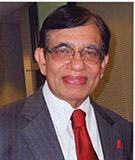
ACC Convention: Orlando 2018
Snapshots of Recent Advances in Cardiology: Part II

The two conditions commonly encountered in clinical practice are heart failure (HF) and diabetes mellitus (DM). Both have reached epidemic status and as I have mentioned, they feed on each other. It’s important for physician and patient to know how to effectively manage these conditions. There were several discussions at the Annual Scientific Session of American College of Cardiology (ACC) in Orlando on this very topic exploring the effect of HF and DM. The general consensus was that both the diabetologists and cardiovascular specialists need to work together to give the best care for their patients. With the availability of emergency management of heart attacks with immediate angioplasty, stents and other innovative procedures leading to improved survival rates, long-term complications such as HF are now beginning to emerge as a major problem.
Current statistics indicate “nearly five million Americans have HF today, an incidence approaching 10 per 1,000 population after the age of 65 years. HF accounts for at least 20 percent of all hospital admissions in persons in this age group,” said one authority during a panel discussion. Moreover, even with proper treatment after the first hospitalization, readmissions are common in this population. “Hospital readmissions are devastating to patients and families and those who are readmitted have a greater chance of mortality. Additionally, readmissions take a heavy toll on our entire health care system.”
Because of that, ACC is developing a “Patient Navigator Program” that will help hospitals and patients to reduce readmission rates while improving patients’ long-term outcomes. Researchers are studying the transition care measures such as lifestyle modifications, compliance with prescribed drugs, post heart attack cardiac rehabilitation programs and other supportive measures that will work best to keep HF well controlled.
We already know that seasonal influenza epidemics steal a lot of lives every year around the world. HF patients are particularly prone to flu-related complications and death. An analysis of six studies conducted in the U.S., Europe and Asia showed that HF patients who received flu vaccine had a decreased risk of death not only from cardiac causes but from any other causes as well. There is still a significant percentage of population who stubbornly refuse to take flu vaccine, which is not advisable particularly if they suffer from heart disease.
Patients who undergo non-cardiac surgeries suffer from cardiovascular complications not infrequently, the estimated incidence being 1.4 percent and 3.9 percent of surgeries. They include acute heart attacks, strokes, and peripheral vascular complications. In the “MANAGE” trial presented, patients who exhibited signs of injury to heart muscle after surgery as evidenced by special blood tests and EKG changes were divided into two groups, one group receiving a blood-thinning drug called dabigatran and the control group receiving only a placebo. The results showed that those who received the blood thinner had a significant decrease in the incidence of heart attacks and strokes peri-operatively compared with the control group.
A major problem we encounter in clinical practice is peripheral vascular disease (PVD) resulting in decreased blood flow in the legs causing pain on walking and restricted mobility. Findings of the “COMPASS” trial presented showed that a combination of rivaroxiban, a blood thinner, and aspirin can significantly lower incidence of major adverse events such as sudden occlusion of the limb artery that can lead to amputation of a leg. This combination also reduced major cardiovascular events such as heart attacks and strokes common among people with PVD.
Technology is now revolutionizing every field and computer applications are improving the diagnostic and treatment capabilities in cardiovascular field as well. A specialized wrist band and corresponding smart watch app can accurately detect atrial fibrillation, a cardiac arrhythmia that increases the risk for stroke. A special algorithm-based data that include medical history, vital signs, EKG abnormalities and blood tests from patients visiting the emergency room with chest pain can be used to predict the presence of a heart attack with 90 percent accuracy. From a therapeutic standpoint, the newest kid on the block is a group of drugs that target inflammation, considered an important cause for heart attacks along with atherosclerosis.
There’s so much ahead in our journey in CV medicine, those patients with serious heart disease can feel confident about a much better long-term outlook. There was considerable excitement and energy in this year’s congregation of cardiologists from all over the world where the latest in cardiovascular research and treatment were discussed.
This concludes this two-part series.
M.P. Ravindra Nathan, M.D., is a cardiologist and Emeritus Editor of AAPI Journal. His book “Stories from My Heart” was recently released. (www.amazon.com or www.bn.com).